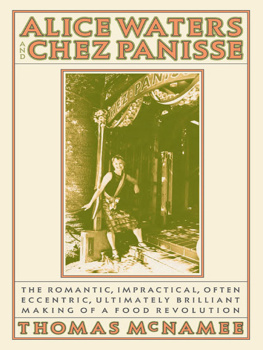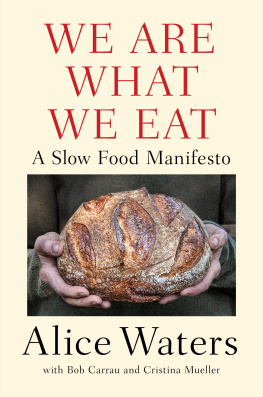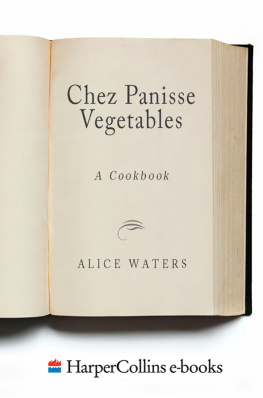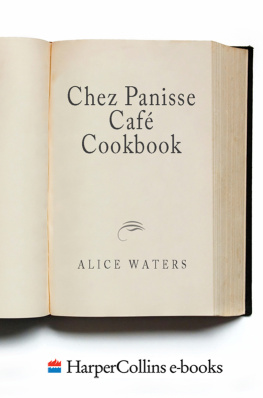ALICE WATERS & CHEZ PANISSE
THE ROMANTIC, IMPRACTICAL,
OFTEN ECCENTRIC, ULTIMATELY BRILLIANT
MAKING OF A FOOD REVOLUTION

THOMAS M C NAMEE
Foreword by R. W. Apple, Jr.
THE PENGUIN PRESS
New York
2007
THE PENGUIN PRESS
Published by the Penguin Group
Penguin Group (USA) Inc., 375 Hudson Street, New York, New York 10014, U.S.A. Penguin Group (Canada), 90 Eglinton Avenue East, Suite 700, Toronto, Ontario, Canada M4P 2Y3 (a division of Pearson Penguin Canada Inc.) Penguin Books Ltd, 80 Strand, London WCR2 0RL, England Penguin Ireland, 25 St. Stephens Green, Dublin 2, Ireland (a division of Penguin Books Ltd) Penguin Books Australia Ltd, 250 Camberwell Road, Camberwell, Victoria 3124, Australia (a division of Pearson Australia Group Pty Ltd) Penguin Books India Pvt Ltd, 11 Community Centre, Panchsheel Park, New Delhi110 017, India Penguin Group (NZ), 67 Apollo Drive, Mairangi Bay, Auckland 1311, New Zealand (a division of Pearson New Zealand Ltd) Penguin Books (South Africa) (Pty) Ltd, 24 Sturdee Avenue, Rosebank, Johannesburg 2196, South Africa
Penguin Books Ltd, Registered Offices: 80 Strand, London WC2R 0RL, England
First published in 2007 by The Penguin Press,
a member of Penguin Group (USA) Inc.
Copyright Thomas McNamee, 2007
All rights reserved
A portion of this book first appeared in Saveur .
Grateful acknowledgment is made for permission to reprint the following copyrighted works: Food neither good to look at nor to eat by Fritz Streiff. By permission of the author.
Chez Panisse song, music, and lyrics by Michael Tilson Thomas. 2001 Kongcha Music. By permission of Michael Tilson Thomas.
Selections from California Dish by Jeremiah Tower (Free Press, 2003). By permission of the author.
Selections from Chez Panisse Menu Cookbook by Alice Waters. Copyright 1982 by Alice Waters. Used by permission of Random House, Inc.
Photograph credits appear on back matter.
Library of Congress Cataloging-in-Publication Data
McNamee, Thomas, 1947
Alice Waters and Chez Panisse: the romantic, impractical, often eccentric, ultimately brilliant making of a food revolution / Thomas McNamee.
p. cm.
Includes bibliographical references and index.
ISBN: 978-1-1012-0208-1
1. Waters, Alice. 2. RestaurateursUnited StatesBiography. 3. Women cooksUnited StatesBiography. 4. Chez Panisse. I. Title.
TX910.5.W38M36 2007
641.5092dc22
[B]
2006050334
Without limiting the rights under copyright reserved above, no part of this publication may be reproduced, stored in or introduced into a retrieval system, or transmitted, in any form or by any means (electronic, mechanical, photocopying, recording, or otherwise), without the prior written permission of both the copyright owner and the above publisher of this book.
The scanning, uploading, and distribution of this book via the Internet or via any other means without the permission of the publisher is illegal and punishable by law. Please purchase only authorized electronic editions and do not participate in or encourage electronic piracy of copyrightable materials. Your support of the authors rights is appreciated.
for
ELIZABETH
FOREWORD
by R. W. Apple, Jr.
By now, everyone in this country who can tell the difference between an clair and an entrecte (and quite a few who cannot) knows who Alice Waters is.
She is, of course, the creator of Chez Panisse in Berkeley, California, one of the fountainheads of California cuisine, which some demanding judges consider the best restaurant in the United States. It is indisputably the most influential one. Before Chez Panisse, even the grandest American restaurants relied on imported, often canned or frozen products; today, the Waters credofresh, local seasonal, and where possible organic ingredientsis followed by hundreds of farmers markets, thousands of restaurants, and millions of home cooks.
Her approach wins plaudits abroad as well as at home. I remember a conference at the opulent Manoir aux QuatSaisons near Oxford, involving leading chefs from the United States, England, and France, where she dazzled her peers. They had arrived with trunks full of raw materials; she brought a few Meyer lemons and not much else, and relied for the rest on the Manoirs wonderful gardens and products on offer in the region, very simply prepared and served. All the chefs whom I asked said that her meal had been their favorite. It made the other meals seem somehow overwrought.
What is little understood, and what Thomas McNamee makes abundantly clear in this penetrating biography, is how unlikely a revolutionary Alice Waters is.
For one thing, she is no chef, at least in the generally understood meaning of the term. She has never attended cooking school and never served the same kind of rigorous apprenticeship, working in a succession of well-established kitchens, as have generations of European and more recently American culinary stars. She cooks, yes, and beautifully, but with some reluctance, and she has run Chez Panisses kitchen only very episodically.
She isnt much of a businesswoman. Well into its period of ascendancy, Chez Panisse lost money, despite the best efforts of a series of business managers (including Ms. Waterss father) to impose fiscal discipline. Her habitual extravagance made their work hard and often all but impossible. In 1972, when the restaurant had been operating for less than a year, no less than thirty thousand dollars worth of wine was unaccounted for.
Nor is she really a writer, despite the excellence and enormous success of her cookbooks. Like so much of her work, they are the products of her interaction with a group of friends, even when her name is the only one listed on the title page, as is sometimes the case.
Perhaps most surprising, the restaurants mature style, marked above all by simplicity, evolved much more slowly than is generally appreciated. It is hard to believe, when one is faced with a trademark Chez Panisse dish like a salad with goat cheese, dependent for its impact on the quality of the greens and the care of the preparation, or a rustic soup of root vegetables, that Chez Panisse once served dishes of extraordinary complexity with no evident connection to northern California.
This was especially true during the tenure of Jeremiah Tower in the kitchen. He reveled in special dinners including surrealistic dishes inspired by Salvador Dal or haute cuisine extravagances like duck stuffed with oysters, shallots, and its liver. A far cry, those, from the eventual house cuisine, influenced by Alices experiences in the south of France, based on fresh herbs, newly picked vegetables, garlic, and olive oil.
So what assets did Ms. Waters bring to the project if not the usual skills of the successful restaurateur? Several.
Perhaps most important, what her old friend Eleanor Bertino calls an iron will. A determination to press on when the staff or her private life was in turmoil, which has not always been visible to the casual observer, disarmed perhaps by her elfin appearance. Eleanor Bertino again: There has always been this interesting contradiction between the delicate little way Alice looks and how she really is. [She wore] these antique hats, delicate little hats that lay close to her headshe looked just like a Pre-Raphaelite angel.










